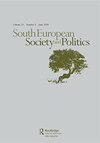欧元区危机后葡萄牙和意大利的选举联盟和政策逆转
IF 4.6
1区 社会学
Q1 POLITICAL SCIENCE
引用次数: 21
摘要
本文将意大利和葡萄牙的放松管制改革和危机后逆转模式与政党选区联系起来。结合来自社会联盟和选举行为辩论的见解,我们使用丹尼尔·奥施(Daniel Oesch)提出的阶级图式,将两国的改革结果与选民的阶级设置联系起来。我们发现,尽管两国执政联盟存在广泛的意识形态差异,但两国政府都撤销了紧缩措施,以保护其选民中的核心选民群体。然而,各个政策领域的逆转程度有所不同。本文章由计算机程序翻译,如有差异,请以英文原文为准。
Electoral Coalitions and Policy Reversals in Portugal and Italy in the Aftermath of the Eurozone Crisis
ABSTRACT This paper links patterns of deregulatory reforms and post-crisis reversals in Italy and Portugal with the electoral constituencies of political parties. Combining insights from the social coalitions and electoral behaviour debates, we link reform outcomes to the class set-up of the electorate in the two countries by using the class schema developed by Daniel Oesch. We find that governments in both countries reversed austerity measures in order to protect core groups of voters within their electorate in spite of wide ideological differences between governing coalitions in the two countries. There is, however, some variation in the extent of the reversals across policy areas.
求助全文
通过发布文献求助,成功后即可免费获取论文全文。
去求助
来源期刊

South European Society and Politics
Multiple-
CiteScore
5.80
自引率
21.20%
发文量
14
期刊介绍:
A leading point of reference for scholars of Southern Europe, South European Society and Politics promotes both comparative and inter-disciplinary analyses, as well as offering innovative single county and sub-national studies. The journal acts as a forum for social, economic, cultural, contemporary historical and political approaches to research on the region, and is particularly keen to sponsor policy–focused studies in all these disciplines. The journal publishes research articles; South European Atlas with election reports and articles on other subjects of topical interest, and an extensive book reviews section, including both review articles and individual book reviews.
 求助内容:
求助内容: 应助结果提醒方式:
应助结果提醒方式:


